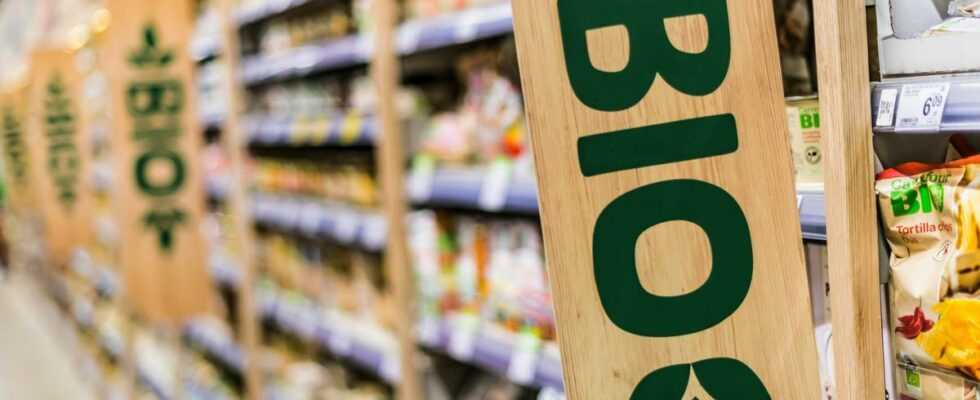With rising prices, some French people are abandoning organic products sold in supermarkets. But the sector continues to survive thanks to local producers.
Meat, pasta, oil, flour or sugar… food prices are soaring due to inflation. This continued to accelerate in April in France to stand at 4.8% over one year, according to an initial estimate published Friday by INSEE. If all departments are impacted by this outbreak, organic is no exception, forcing the French to change their consumption habits.
Read also“It is urgent to make food a major cause of the five-year term”
“I used to buy organic products on promotion because they are of better quality but today it becomes very difficult“, laments Mathilde, 44 years old. Same observation for Anne-Julie, 31, who “will have to go back to foods that are not organic“. For Philippe Goetzmann, agri-food and retail consultant, “household budgets are not stretchable. The working and middle classes are thus forced to abandon organic and go downmarket.“. According to figures from analyst NielsenIQ, sales of private label organic products fell 4.9% in the first three months of the year.
The preferred space for large surfaces
Laure Verdeau, director of Agence Bio, puts it into perspective: “the French are less and less hampered by the price of organic“, especially among young people and the most modest. According to a study in partnership with the CSA Institute, 70% of buyers considered at the end of 2021 that organic products were “too expensive“, against 73% in 2020. Laure Verdeau recalls that the higher prices of organic are justified by “more controls for growers and low yields“. But the consumption of organic would make it possible to “preserve 30% of biodiversity and invest in the long term“, completes the director.
Read alsoLa Boulangère nibbling market share thanks to organic
For Valérie Cupillard, culinary author specializing in organic, customers are no longer interested in the products offered in supermarkets. “Today, consumers are turning to unprocessed products, favoring local producers. They are looking for a more family side“, she remarks. Josy collects her organic basket every week, made up only of “seasonal products“. “It’s more expensive than food in supermarkets but I prefer to deprive myself of restaurants or vacations and eat well“says the sexagenarian. Philippe prefers to go to the market to buy local producers of “vegetables, fish, oysters, pigeons or mutton“. The septuagenarian assures him, “these products are a guarantee of quality and they have nothing to do with those sold in supermarkets“.
“No collapse of the sector”
Organic therefore still attracts consumers, but in new forms. “Currently there is no collapse of the sector, even if the organic market is coughing quite hard these days“, emphasizes Philippe Goetzmann. He analyzes that between 2007 and 2018 “there was a race for organic shallots with many offers dedicated to this market“. “In 2018, industry players began to see that increasing supply was no longer creating value.» «During the Covid-19 crisis, there was a bubble phenomenon around organic products because the other products were out of stock“, he says. Philippe Goetzmann specifies that today “economic players begin to adjust the model and rebalance supply“.
This is particularly the case for Leclerc, which is redesigning its strategy around organic products. In 2018, the group opened its first store in Fontaine-lès-Dijon in Côte d’Or. Michel-Edouard Leclerc declared that his objective was to “become a European leader in organic production“. He was aiming for 40 organic stores planned in 2019 and 200 more in 2021. But so far, only 17 businesses specializing in organic have seen the light of day. In question, sales targets that have not been achieved. In early April, the Fontaine-lès-Dijon store changed its name fromLeclerc organic market” has a “Leclerc Expressand no longer selling only organic products.
SEE ALSO – Organic farming, Omicron, Proust: the news deciphered in Points of view
